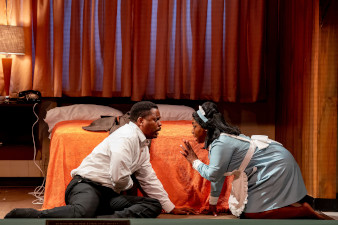
Dorothy
Chansky
| "The Mountaintop" Weston
Playhouse
You would be well within the realm of logical expectations to anticipate that a play with Dr. Martin Luther King, Jr., at its center might feature some passionate speechifying. "The Mountaintop" by Katori Hall most certainly does do that. But the fiery preaching in this two-hander is delivered not by King, but by a chambermaid named Camae. Well, sort of a chambermaid. "The Mountaintop", now playing at Vermont’s Weston Playhouse, is set on the last night of King’s life, immediately following a speech he gave in support of striking sanitation workers in Memphis, Tennessee, in 1968. Part of the text of that provided the name by which it is now popularly known: “I’ve been to "The Mountaintop." Assassinated the following day, King was, like Moses, not destined to see the promised land to which he hoped to deliver his people. And, like the present-day people who look to either of these leaders as beacons, we are to understand that there will only be a life of peace and morality and fair play when we forge and tend to it. If "The Mountaintop" is at all a sermon, that is its theme. Hall’s play is not a sermon, however. Or, if it is, it is gripping, funny, and irreverent at the same time that it is driven by ethics, history, and even philosophy. King, played by Neil Dawson with a perfect mixture of charisma, sexiness, charm, gravitas, fear, and hubris, comes across as both humanly flawed and slightly larger than life. He is scribbling his next speech and wanting cigarettes and coffee when we meet him in his less than glamorous room at the Lorraine Motel. It is, in every way, a dark and stormy night. Out of the rain emerges Camae, played by Maechi Aharanwa, bearing the coffee King has ordered, and also able to conjure cigarettes and liquor to calm his nerves. There are hints that this is no ordinary chambermaid, as the newspaper she brings has the next day’s date on it and, when King suspiciously asks if she is with the F.B.I, her cryptic reply is, “no, something bigger.” Big shout out to costume designer April M. Hickman for dropping her own playful hint. This maid, attired in a turquoise uniform with white collar and apron, is wearing matching high heels. Uh huh. Something unusual and special here. When, much later in the play, we see that she has God’s direct dial memorized and that she knows of such future phenomena as cell phones and dropped calls, Hall’s inventiveness becomes yet another reason to value theatre as historiography. Hall has said she wrote Camae to honor her mother, who would have liked to see King in person that night but stayed home out of fear. Camae is a spokesperson for Blacks who were both afraid and weary. King’s approach was too tame and too ineffective for people who saw marches as just more walking. When King asks Camae what she would say if she were in his shoes, she literally borrows them, stands on the bed, and delivers a fire and brimstone tirade that reaches a climax with “kill the white man.” Not, however, with guns. With minds. An unapologetic separatist, Camae sees King as an accommodationist. Yet she also sees him as a hero. Although there is nothing this corny in the play, Camae almost hints that if King had not been who he was, someone would have had to invent him. Aharanwa comes close to stealing the show with the in-his-shoes (she wears his jacket, too) speech. Except that she also threatens theft with her humor, her come-hither sexiness, and her ability to soothe and save. And because Dawson may cede the floor when the script calls for that, he never cedes the field. Give this duo their own movie or prime time television show or bespoke dramedy. Director Raz Golden has culled variegated and nuanced performances from both actors. The wide, box-like set with a glass front (by Frank J. Oliva) calls to mind nothing so much as a museum vitrine, and the horizontality with relative lack of depth and height demand movement that can be fluid without looking closed in. Golden makes this happen. The final moments of the play, delivered from the floor in front of the stage, have King in front of a plaque that is a replica of the plaque placed in front of the Lorraine Motel, which is now a civil rights museum. Long after the actors have left the playing area, feathers from their playful pillow fight and the plaque are reminders that King was both brave and frightened; that history never stands still; and that “better living through chemistry” is a phrase worthy of what’s generated by this production’s two players. |
| recordings | coupons | publications | classified |

